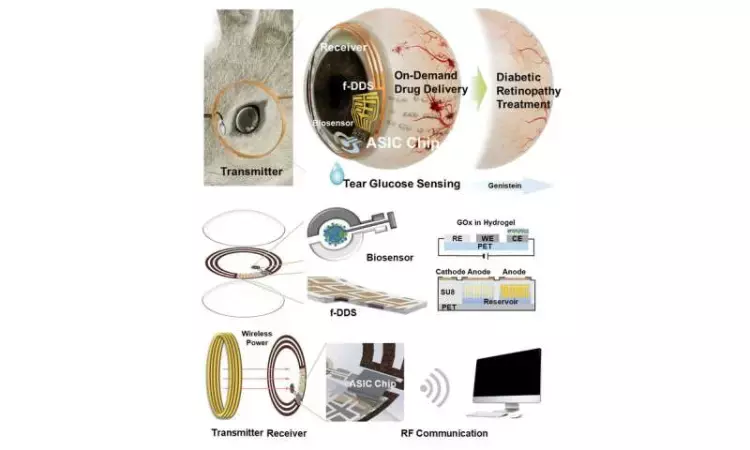- Home
- Medical news & Guidelines
- Anesthesiology
- Cardiology and CTVS
- Critical Care
- Dentistry
- Dermatology
- Diabetes and Endocrinology
- ENT
- Gastroenterology
- Medicine
- Nephrology
- Neurology
- Obstretics-Gynaecology
- Oncology
- Ophthalmology
- Orthopaedics
- Pediatrics-Neonatology
- Psychiatry
- Pulmonology
- Radiology
- Surgery
- Urology
- Laboratory Medicine
- Diet
- Nursing
- Paramedical
- Physiotherapy
- Health news
- Fact Check
- Bone Health Fact Check
- Brain Health Fact Check
- Cancer Related Fact Check
- Child Care Fact Check
- Dental and oral health fact check
- Diabetes and metabolic health fact check
- Diet and Nutrition Fact Check
- Eye and ENT Care Fact Check
- Fitness fact check
- Gut health fact check
- Heart health fact check
- Kidney health fact check
- Medical education fact check
- Men's health fact check
- Respiratory fact check
- Skin and hair care fact check
- Vaccine and Immunization fact check
- Women's health fact check
- AYUSH
- State News
- Andaman and Nicobar Islands
- Andhra Pradesh
- Arunachal Pradesh
- Assam
- Bihar
- Chandigarh
- Chattisgarh
- Dadra and Nagar Haveli
- Daman and Diu
- Delhi
- Goa
- Gujarat
- Haryana
- Himachal Pradesh
- Jammu & Kashmir
- Jharkhand
- Karnataka
- Kerala
- Ladakh
- Lakshadweep
- Madhya Pradesh
- Maharashtra
- Manipur
- Meghalaya
- Mizoram
- Nagaland
- Odisha
- Puducherry
- Punjab
- Rajasthan
- Sikkim
- Tamil Nadu
- Telangana
- Tripura
- Uttar Pradesh
- Uttrakhand
- West Bengal
- Medical Education
- Industry
Smart contact lenses may diagnose diabetes and deliver drugs in retinopathy
 Smart contact lens for diabetes monitoring and diabetic retinopathy therapy. Credit: Sei Kwang Hahn, Geon-Hui Lee, Su-Kyoung Kim
Smart contact lens for diabetes monitoring and diabetic retinopathy therapy. Credit: Sei Kwang Hahn, Geon-Hui Lee, Su-Kyoung KimResearchers have developed smart contact lenses for both continuous glucose monitoring and treatment of diabetic retinopathy.
The contact lenses used to correct poor vision, may in coming times could also monitor diabetes and deliver medications in a new study.The first study to show a combination of blood sugar sensing and drug delivery technology in a contact lens has been published in the journal Science Advances.
The smart contact lens contains ultrathin, flexible electrical circuits and a microcontroller chip. It's currently about 0.2 millimeters (mm) thick, and Hahn said the researchers hope to reduce that to 0.15 mm.The smart contact lens may be used as an excellent interface between the human body and an electronic device for wearable healthcare applications.
In patients with diabetes, monitoring and controlling blood sugar levels are extremely important because having high blood glucose levels for extended periods of time can lead to a host of diabetes complications. An enzyme based finger-pricking method is the most commonly used technology in diabetic assessment. However, such approach has been said to reduce compliance among diabetic patients.
The new lenses have been designed to check blood sugar levels and to deliver drugs to the eye in diabetic retinopathy.
In the last several decades, many attempts have been made to monitor glucose levels in tears with smart contact lenses, but they are often not used due to poor wearability.
Dr Sei Kwang Hahn, professor at Pohang University of Science and Technology in South Korea said
"Among various wearable devices, a smart contact lens is especially promising for health care applications because it can be used as an excellent interface between the human body and an electronic device"
Chemicals on the contact lens bind with glucose and trigger an electrical current change that is proportional to the amount of glucose. The electric current is also used to dissolve gold membranes that seal drug reservoirs, triggering the release of a dose of the drug, Hahn explained.
The researchers have successfully demonstrated the feasibility of smart contact lenses for noninvasive and continuous diabetic diagnosis and diabetic retinopathy therapy.They are hoping to begin human clinical trials in 2021 and have a commercial product as soon as 2023.
For further reference log on to:
D.H. Keum el al., "Wireless smart contact lens for diabetic diagnosis and therapy," Science Advances (2020). DOI: 10.1126/sciadv.aba3252
Dr Kamal Kant Kohli-MBBS, DTCD- a chest specialist with more than 30 years of practice and a flair for writing clinical articles, Dr Kamal Kant Kohli joined Medical Dialogues as a Chief Editor of Medical News. Besides writing articles, as an editor, he proofreads and verifies all the medical content published on Medical Dialogues including those coming from journals, studies,medical conferences,guidelines etc. Email: drkohli@medicaldialogues.in. Contact no. 011-43720751


